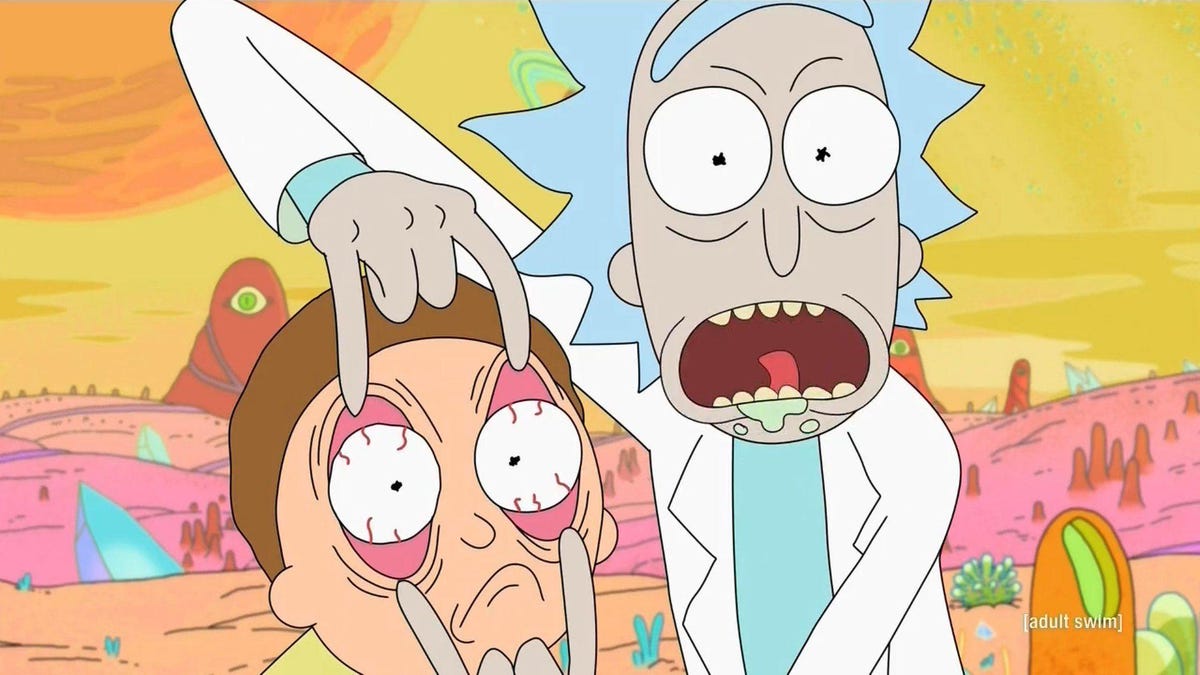'Rick and Morty' Szechuan sauce and the dark side of fandom
Commentary: The mad grab for the sauce briefly offered by McDonald's shows just how obnoxious some quarters of geek culture can get.

A recurring argument has raged for as long as I've lived: How much should we blame creators for how their work influences people? Not much, I've always thought. We've just seen why.
Between charges of widespread sexual harassment in Hollywood and Eminem in parking garages, you may not have noticed men and women around the US losing their minds over McDonald's sauce. Like, really going crazy.
It's all linked to "Rick and Morty," the hit Adult Swim animated TV show that just ended its third season. In the show, Rick goes on a 30-second rant about Szechuan McNugget sauce McDonald's briefly offered in 1998 as part of a tie-in with Disney movie "Mulan," joking that he'll get more if it takes nine seasons.
That was back in April. McDonald's, looking to attract publicity and make some much-needed McDollars, earlier this month said it'd bring the sauce back for one day only, Oct. 7, and at limited locations. That's when everything got wild. There wasn't enough supply to meet the rabid, internet-fueled demand, leading to ridiculous rabble across the US.
we really gotta raise the minimum wage pic.twitter.com/fflcxw7MJ5
— Business CEO 🇺🇸 (@jackdwagner) October 9, 2017
Here at the San Jose Mcdonalds. This is our reaction to the shortage of #szechuansauce #giveusthesauce #rickandmorty pic.twitter.com/sIGaUZKDKj
— Kevin Alberi (@Chauncey_Boy) October 7, 2017
Cops are at Wellington McDonalds where tons of angry people lined up for hrs for Rick and Morty Szechuan sauce only to learn they had none pic.twitter.com/3T272osid4
— Lulu Ramadan (@luluramadan) October 7, 2017
People have been buying pictures of the sauce on eBay. One guy even traded his car for a packet of the stuff. McDonald's, for its part, has vowed to make up for the promotion disaster by bringing back the sauce this winter.
Thankfully, no one is blaming the show or its creators for the stupidity of a small number of fans. But that's not always the case. Musicians, movies and especially video games often get accused of influencing our behavior, usually after some grim incident. Just last year, state government here in Australia actually blamed a crime spike on "the Grand Theft Auto generation."
Click for more Boom With a View.
Of course, violence and crime are different than stupidity and disorder. You can only guess whether more people would be reprimanding "Rick and Morty" creators Dan Harmon and Justin Roiland or the content of the show if something truly unfortunate happened as crowds chanted for sauce they could buy at a grocery store.
But as it stands, people have a largely unspoken understanding that this is symptomatic of geek culture 's dark side. The culture, or at least part of it, is to blame, not whatever stimulus mobilizes it. A lot of that dark side, incidentally, has previously been exemplified within the show's fan base, which is renowned for being obnoxious.
Many pat themselves on the back for that reputation, to the extent that their arrogance has become an internet meme unto itself. More worrisome, some "Rick and Morty" superfans last month harassed and even doxxed the show's female writers, blaming them for an apparent dip in show quality.
Crucially, the show itself didn't incite any of this. Rick's whole Szechuan screed was about rejecting sentimentality and actually discouraged this type of, well, sentimentality. Meanwhile, if you Google "Is Rick and Morty sexist," you won't even get any Tumblr photo essays on how the show is covertly oppressive. That's a monumental achievement for a show in 2017.
Instead, if you do actually search that, you'll find Harmon slamming the guilty fans, calling out "a testosterone-based subculture patting themselves on the back for trolling these women."
This isn't, of course, all of the show's fans (#NotAllMortys). The third season of "Rick and Morty" had an average viewership of well over 2 million, and it's likely only a tiny minority of those viewers doing the damage. I like the show, and if you've seen it you probably like it too. But a small percentage of 2 million is enough to cause scenes in McDonald's around the US and make life difficult for a team of female writers.
Qualifications aside, Harmon is right. We know he's right, which is why, just this one time, no one is blaming a TV show for the insanity of its fans. Those fans are going to do what they do no matter what the stimulus is. It wasn't so long ago No Man's Sky creators got death threats for delaying the game. This is also the same subculture that brought us GamerGate. Need I say more?
I just hope people follow the same logic next time someone's found to have stood in the vicinity of a video game in the six months prior to doing something terrible.
Batteries Not Included: The CNET team shares experiences that remind us why tech stuff is cool.
CNET Magazine: Check out a sampling of the stories you'll find in CNET's newsstand edition.

